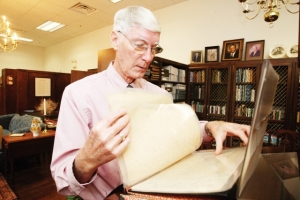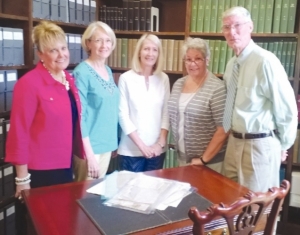Local family's discovery yields clues for historians
By Josh Ellerbrock
Published in News on October 21, 2013 1:46 PM

News-Argus/CASEY MOZINGO
Mount Olive College's Free Will Baptist Collection Curator Gary Barefoot looks through a number of photocopies of the original petition, written in 1729 by Paul Palmer and William Burgess, that asked for permission to form the first congregation of Free Will Baptists in the southeastern part of what were then the 13 English colonies.

Submitted photo
From left are sisters Susan Glover, Barbara Novicki, Frances Gooden and Nancy Satterfield, with Gary Barefoot, curator of the Free Will Baptist Historical Collection at Mount Olive College. The sisters recently donated valuable historical documents to the college.
It's only a matter of time until someone's collection becomes a museum's exhibit.
"The Harpers never threw anything away," Nancy Harper Satterfield said.
Today, Mrs. Satterfield and her sisters, Barbara Novicki, Susan Glover and Frances Gooden, have been on the receiving end of just that sort of collection, and they are looking for a place to put their finds -- papers, letters and receipts dating back before the Civil War.
The first beneficiary is the Free Will Baptist Historical Collection at Mount Olive College.
Housed in the second floor of Moye Library on the college campus, the Free Will Baptist Collection features personal papers, church minutes, treatises, photographs, pamphlets, bulletins, films, tapes and even an old organ that one woman won from an FWB newspaper contest.
"(She) offered it to Dr. Raper, and you know Dr. Raper. He didn't turn anything down," FWB Historical Collection curator Gary Barefoot said.
Barefoot estimates that the current collection consists of roughly 15,000 items and is the best collection of its kind in the South. In some way or another, everything is related to the Free Will Baptist denomination that started back in 1727.
Many of the items, such as the Harpers' donation, are gifted to the collection with no strings attached.
Other families, however, need convincing when giving items to the collection. Barefoot finds that old ledger books kept by church clerks are often thought of as heirlooms in the family.
"Some things people are reluctant to give," Barefoot said.
But church records belong to the church even if clerks kept them in their safekeeping, he said. Some families even try to eliminate certain historical records, such as an ancestor's excommunication, that might blot a family's squeaky clean relationship with the church.
Barefoot encourages FWB churches to keep a copy of their records with the collection in case of fire or flood.
The Harper sisters, however, were less reluctant to give their collection; they gifted a number of church clerk Whitfield Grady's papers written between 1832 and the late 1878 to the collection.
"Whitfield Grady was my grandfather's grandfather. His papers had been stored in a trunk," Mrs. Satterfield.
"These papers are some of the most important documents we received in the last few years," Barefoot said. "The papers allow local Free Will Baptists to look into the history of their faith and their families. Listed among the minutes are many local names that can be most likely be traced to several families in the area."
For example, Barefoot could find the grandfather of Lloyd Vernon, Mount Olive College's first president, named in some of the conference minutes.
The Grady papers also revealed an interesting time in FWB history when a number of sister churches in the local area tried to develop the constitution of a "regular Baptist" church.
After reading through the Grady collection, Barefoot said the churches had a hard time trying to come together and agreeing on the constitution.
Only one of the churches referenced in the papers, Indian Springs located in Seven Springs, has survived the years. The others -- Rilyes Creek, Prospect, Limestone and Pleasant Grove in Lenoir County -- have disbanded.
But the Whitfield Grady papers aren't the only records that the Harpers have on hand.
"We still have tons and tons of papers left. Whitfield Grady's father-in-law was a Kornegay in Duplin County. We have lots of letters from the Kornegays and hundreds of little receipts. He never threw away anything," Mrs. Satterfield said.
Those receipts can be useful, she said. Alone, a single receipt from the 19th century doesn't say much, but if you put them together, they clue historians into the movements of troops of soldiers during the Civil War.
"Civil War historians immediately recognized the (receipt names). My sisters and I weren't too involved in Civil War history, but we want to see them go to a home where they will be appreciated," Mrs. Satterfield said.
The Harpers plan on gifting the receipt papers to the Neuse Museum in Kinston when it opens up.
"It's just been a labor of love to me. My sisters are really excited whenever I discover something. It has just been a joy and pleasure to me to do this research."
